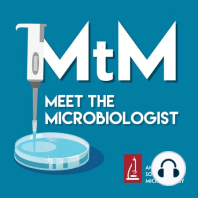19 min listen

Françoise Barré-Sinoussi's Discovery of HIV
Françoise Barré-Sinoussi's Discovery of HIV
ratings:
Length:
58 minutes
Released:
Nov 19, 2022
Format:
Podcast episode
Description
Dr. Robert Gaynes, distinguished physician and professor of infectious diseases at Emory University, joins Meet the Microbiologist for a unique episode, in which we share the story of Françoise Barré-Sinoussi, the French, female scientist who discovered HIV and found herself at the heart of one of the most bitter scientific disputes in recent history. Subscribe (free) on Apple Podcasts, Spotify, Google Podcasts, Android, RSS or by email. Ashley's Biggest Takeaways The U.S. Centers for Disease Control and Prevention (CDC)’s Morbidity and Mortality Weekly Report first reported on a cluster of unusual infections in June of 1981, which would become known as AIDS. Evidence suggested that the disease was sexually transmitted and could be transferred via contaminated blood supply and products, as well as contaminated needles, and could be passed from mother to child. All hemophiliacs of this generation acquired AIDS (15,000 in the U.S. alone). The fact that the microbe was small enough to evade filters used to screen the clotting factor given to hemophiliacs indicated that the etiologic agent was a virus. AIDS patients had low counts of T-lymphocytes called CD4 cells. By 1993, the most likely virus candidates included, a relative of hepatitis B virus, some kind of herpes virus or a retrovirus. Howard Temin discovered reverse transcriptase, working with Rous sarcoma in the 50s and 60s. His work upset the Central Dogma of Genetics, and at first people not only did not believe him, but also ridiculed him for this claim. Research conducted by David Baltimore validated Temin’s work, and Temin, Baltimore and Renato Dulbecco shared the Nobel Prize for the discovery in 1975. Robert Gallo of the U.S. National Institute of Health (NIH), discovered the first example of a human retrovirus—human T-cell lymphotropic virus (HTLV-1). Françoise Barré-Sinoussi worked on murine retroviruses in a laboratory unit run by Luc Montagnier, where she became very good at isolating retroviruses from culture. In 1982, doctors gave lab Montagnier’s lab a sample taken from a with generalized adenopathy, a syndrome that was a precursor to AIDS. Barré-Sinoussi began to detect evidence of reverse transcriptase in cell culture 2 days after the samples were brought to her lab. Barré-Sinoussi and Luc Montagnier were recognized for the discovery of HIV with the 2008 Nobel Prize in Physiology or Medicine. Links for the Episode: From the ancient worlds of Hippocrates and Avicenna to the early 20th century hospitals of Paul Ehrlich and Lillian Wald to the modern-day laboratories of François Barré-Sinoussi and Barry Marshall, Germ Theory brings to life the inspiring stories of medical pioneers whose work helped change the very fabric of our understanding of how we think about and treat infectious diseases. Germ Theory: Medical Pioneers in Infectious Diseases The second edition of Germ Theory, which will include chapters on Françoise Barré-Sinoussi, Barry Marshall and Tony Fauci, will publish in Spring 2023.
Released:
Nov 19, 2022
Format:
Podcast episode
Titles in the series (100)
MTS24 - Jeff Bender - MRSA in Animals: Jeff Bender is a professor of veterinary public health at the University of Minnesota, and his research interests lie in the intersection of animal health and human health, including animal-borne diseases of humans, food safety, and antibiotic resistant p by Meet the Microbiologist